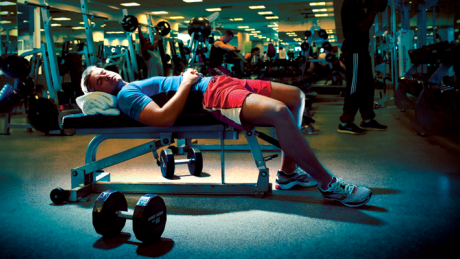Are you getting enough sleep?
A good night’s sleep is crucial if you want to build muscle, says Charles Poliquin

When people think about building muscle, the two things they always consider are training and nutrition. But sleep quality and quantity are equally pivotal. That’s because sleep deprivation lowers testosterone and growth hormone, which play important roles in repairing muscle tissue. What’s more, poor sleep is linked to increased inflammation in the body – which will make it harder to recover from your gym sessions – and an increase in the levels of insulin and cortisol, both of which lead to increased fat storage and insulin resistance.
Research published by Vielife in 2012 found that more than 60% of British people get less than seven hours’ sleep a night. Most health practitioners recommend getting eight to nine hours, so there’s a good chance your sleeping habits are hampering your muscle-building efforts. With that in mind, here are my top tips to help you increase the quality and quantity of your shut-eye.
Think positive
Before you go to bed, grab a pad and pen and write down a full page of things you’re grateful for in life. Start the sentences with ‘I am grateful for’ or ‘Thank you for’. This will put you in a very positive and calm frame of mind and will stop your mind from racing all night and keeping you awake. Also try answering three key questions: ‘What did I do today that was nice for someone?’ ‘What did someone do that was nice for me?’ and ‘What did I learn today?’ Answering these questions will put your life in perspective, reset your brain in a positive way and enable you to fall asleep more easily. Every single client of mine who has used this technique has seen an improvement in the quality of his or her sleep.
Sleep in a bat cave
You should aim to sleep in complete darkness or as close to it as possible. Bear in mind that even the tiniest bit of light in the room can mess up your daily biological processes and affect your body’s production of melatonin and serotonin, which will have an adverse affect on your sleep. It really doesn’t take much light – even something as dim as the standby light on your television can make a difference. The same rule applies if you have to get up in the night to use the toilet – if possible, do it with the light off. Turning it on will instantly interrupt your body’s production of melatonin.
Minimise electrical fields
You will be amazed by how much better you’ll sleep if you minimise the electromagnetic fields around your bed. Turn off any plug sockets that don’t need to be left on overnight, and if you need to use an alarm clock, buy a battery-operated one. Also, make sure you keep the clock out of view, especially if you’re a worrier who has difficulty staying asleep – watching the clock if you do wake up in the night will only make things worse. Covering it with a towel will minimise light and remove the temptation to look at it, without stopping it from waking you up in the morning.
Stretch in the evening
Performing static stretches in the evening is an excellent way to calm an excited nervous system and get your body ready for sleep. Static stretching has also been shown to accelerate strength and muscle-building gains. Current thinking is that gains in static flexibility are directly proportional to the time muscles spend being stretched, so go for multiple sets of at least 15-second stretches, returning to the start position between each.
Combat stress with magnesium
Cortisol is a stress hormone produced by the adrenal glands. High levels of cortisol will affect your quality of sleep, to the point where you might get eight hours but still wake up feeling exhausted. Taking magnesium will help to counteract this because it plays a key role in detoxifying cortisol in the body. What’s more, several studies have found low levels of magnesium can alter electrical activity in the brain and cause agitated sleep. Try a supplement or eating magnesium-rich foods such as spinach, pumpkin seeds and soya beans.
Get the Coach Newsletter
Sign up for workout ideas, training advice, reviews of the latest gear and more.
Avoid junk in the evening
Eating grains and refined sugars before you go to bed will raise your blood sugar levels and create a reactive hypoglycaemic effect that will wake you up and make it difficult to fall asleep again. Refined grains also contain allergens such as gluten, which will cause the body to produce more cortisol. Instead, try a pre-bedtime snack of tryptophan-rich almonds and calcium-packed milk, both of which will help your body produce more sleep-inducing serotonin.
One of the world's premier strength coaches, Charles Poliquin has successfully trained professional athletes and Olympians worldwide. Poliquin writes a monthly column for Men's Fitness about how to train as effectively as possible.

